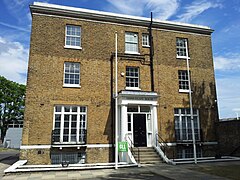Greenwich Leisure Limited![]() |
 Middlegate House, GLL headquarters |
| Company type | Industrial and Provident Society |
|---|
| Industry | Sport, leisure and culture |
|---|
| Founded | 1993 |
|---|
| Headquarters | Royal Arsenal
London, SE18
United Kingdom |
|---|
Key people | Peter Bundey – CEO, Phil Donnay – Deputy CEO, Mark Sesnan OBE – Founder |
|---|
| Revenue | £306 million (2022)[1] |
|---|
Number of employees | 10,800 |
|---|
| Website | www.gll.org |
|---|
Greenwich Leisure Ltd (GLL), operating under the brand "Better", is a British social enterprise organisation which runs sport and leisure facilities, [2] on behalf of local authorities in London and across the UK. Its headquarters is in Middlegate House, the 1810-built former storekeeper's mansion at Royal Arsenal, Woolwich, South East London.
It has operated the GLL Sport Foundation since 2007, providing support to young athletes and is one of the largest independent athlete schemes in the UK.[3]
Unite the Union has argued that the social enterprise does not provide the British taxpayer with good value for money due to its dependence on public funds and the casual labour market.[2]
History
GLL was established to run local services in the London Borough of Greenwich in 1993 as a non profit distributing co-operative. In the following years it started to run services for other local authorities. It also manages Crystal Palace National Sports Centre. On 9 January 2012 it was announced that GLL would be managing the Aquatics Centre[4] and the "copper box" Multi-Use Arena of the London 2012 Olympic Games from 2013 for 10 years.
In June 2012 GLL rebranded all their centres under the "Better" brand.[5] The social-enterprize faced significant scrutiny during the COVID-19 pandemic due to its reliance on local authority bailouts and the government furlough scheme. Critics, including trade unions, have questioned the sustainability of its business model, which depends heavily on public funding and employs a large proportion of staff on flexible contracts.[2]
The pandemic has highlighted vulnerabilities in GLL's operations, with the company reporting £170 million in lost revenue and needing to use £20 million of its reserves. It also secured a £20 million loan, cut over 500 jobs,[2] and relied on support from local councils,[2] many of which are financially strained.[2] For example, Croydon Council, which declared itself effectively bankrupt, was among those negotiating bailouts with GLL. Unite the union has argued that GLL's dependence on public funds and casual labour makes it a costly and unsustainable model,[2] calling for services to be brought back under council control in areas such as Belfast and Swindon.[2]
GLL’s critics have also pointed to its decision to close leisure facilities during the pandemic, including outdoor pools, despite evidence suggesting that swimming in chlorinated water poses minimal risk of COVID-19 transmission.[2] Furthermore, many of its less efficient facilities, particularly in Cornwall, Cumbria, and Newcastle, remain closed, raising concerns about long-term service provision in these areas.[2]
In 2021, Unite’s regional officer, Onay Kasab, criticised the outsourcing model used by GLL, asserting that it ultimately results in higher costs for taxpayers.[2]
In April 2022, GLL became the largest operator of London 2012 legacy venues, when it entered a new partnership with Lee Valley Regional Park Authority. These included London 2012 venues at Lee Valley Velo Park, Lee Valley Hockey & Tennis Centre, and Lee Valley White Water Centre.[6]
In November 2022 GLL emailed its members to inform them that it was cutting its swimming pool opening times because it could not afford to heat the water.[4]
Structure
GLL is a staff-led 'Leisure Trust', social enterprise structured as an Industrial and Provident Society[7] for the benefit of the community. The members of the co-operative and therefore owners of the company are the workers of GLL.
References